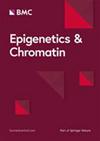Imprinted DNA methylation of the H19 ICR is established and maintained in vivo in the absence of Kaiso
IF 4.2
2区 生物学
Q1 GENETICS & HEREDITY
引用次数: 0
Abstract
Paternal allele-specific DNA methylation of the imprinting control region (H19 ICR) controls genomic imprinting at the Igf2/H19 locus. We previously demonstrated that the mouse H19 ICR transgene acquires imprinted DNA methylation in preimplantation mouse embryos. This activity is also present in the endogenous H19 ICR and protects it from genome-wide reprogramming after fertilization. We also identified a 118-bp sequence within the H19 ICR that is responsible for post-fertilization imprinted methylation. Two mutations, one in the five RCTG motifs and the other a 36-bp deletion both in the 118-bp segment, caused complete and partial loss, respectively, of methylation following paternal transmission in each transgenic mouse. Interestingly, these mutations overlap with the binding site for the transcription factor Kaiso, which is reportedly involved in maintaining paternal methylation at the human H19 ICR (IC1) in cultured cells. In this study, we investigated if Kaiso regulates imprinted DNA methylation of the H19 ICR in vivo. Neither Kaiso deletion nor mutation of Kaiso binding sites in the 118-bp region affected DNA methylation of the mouse H19 ICR transgene. The endogenous mouse H19 ICR was methylated in a wild-type manner in Kaiso-null mutant mice. Additionally, the human IC1 transgene acquired imprinted DNA methylation after fertilization in the absence of Kaiso. Our results indicate that Kaiso is not essential for either post-fertilization imprinted DNA methylation of the transgenic H19 ICR in mouse or for methylation imprinting of the endogenous mouse H19 ICR.在没有 Kaiso 的情况下,体内 H19 ICR 的印迹 DNA 甲基化得以建立和维持
父系等位基因特异性印记控制区(H19 ICR)的 DNA 甲基化控制着 Igf2/H19 基因座的基因组印记。我们以前曾证实,小鼠 H19 ICR 转基因在植入前小鼠胚胎中获得了印记 DNA 甲基化。这种活性也存在于内源性 H19 ICR 中,并在受精后保护其免受全基因组重编程。我们还在 H19 ICR 中发现了一个 118-bp 的序列,该序列负责受精后的印记甲基化。在每只转基因小鼠中,有两个突变(一个是五个 RCTG 矩阵中的突变,另一个是 118 bp 序列中 36 bp 的缺失)分别导致了父系遗传后甲基化的完全和部分缺失。有趣的是,这些突变与转录因子 Kaiso 的结合位点重叠,据报道,Kaiso 在培养细胞中参与维持人类 H19 ICR(IC1)的父系甲基化。在这项研究中,我们调查了 Kaiso 是否调节体内 H19 ICR 的印记 DNA 甲基化。无论是 Kaiso 缺失还是 118-bp 区域中 Kaiso 结合位点的突变都不会影响小鼠 H19 ICR 转基因的 DNA 甲基化。内源性小鼠 H19 ICR 在 Kaiso 缺失突变小鼠体内以野生型方式被甲基化。此外,在 Kaiso 缺失的情况下,人类 IC1 转基因在受精后获得了印记 DNA 甲基化。我们的研究结果表明,Kaiso对于小鼠转基因H19 ICR受精后的印记DNA甲基化或小鼠内源H19 ICR的甲基化印记都不是必需的。
本文章由计算机程序翻译,如有差异,请以英文原文为准。
求助全文
约1分钟内获得全文
求助全文
来源期刊

Epigenetics & Chromatin
GENETICS & HEREDITY-
CiteScore
7.00
自引率
0.00%
发文量
35
审稿时长
1 months
期刊介绍:
Epigenetics & Chromatin is a peer-reviewed, open access, online journal that publishes research, and reviews, providing novel insights into epigenetic inheritance and chromatin-based interactions. The journal aims to understand how gene and chromosomal elements are regulated and their activities maintained during processes such as cell division, differentiation and environmental alteration.
 求助内容:
求助内容: 应助结果提醒方式:
应助结果提醒方式:


